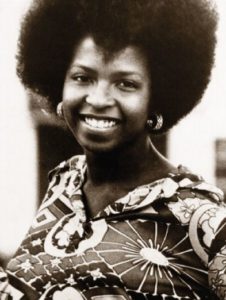When most people think of Miami, they think of retirees, Crockett and Tubbs, sultry tropical nights, and hot Latin rhythms. What many people don’t associate with Miami is classic soul music. But if you dig down a little deeper into the city’s musical history, you will find a deep vein of southern soul.
Betty Wright was born in Miami, and she was only two-years-old when she began to sing in her first gospel group. The Echoes of Joy also included two of Wright’s siblings. The group’s first album was released in 1956, and they worked together into the sixties. Wright was only 11 when the Echoes of Joy broke up in 1965, and she made the decision to move from gospel to secular music.
Wright began to sing in talent shows, and it was at one of those shows that she was spotted by the owner of a local record label. By the following year, Wright had released two singles for the label. “Thank You Baby,” and “Paralyzed” made Wright a big star in Miami.
There was a legendary music business figure by the name of Henry Stone in Miami at the time. Stone owned a company called TK Productions, and one of the company’s labels was Alston Records. When Wright was still a teenager she began discovering local talent and getting them signed to Alston. Among her discoveries were George and Gwen McRae who would go on to become stars in their own right.
Wright’s first hit for Alston was “Girls Can’t Do What Guys Do.” She was only 15 when the single reached the #33 spot on the Billboard Hot 100, and #15 on the U.S. Hot Rhythm & Blues Singles chart. The single was also included on Wright’s debut album, My First Time Around, also released in 1968. In 1970, Wright had a Top 40 R&B single with “Pure Love.” She was still in high school at the time.

In 1971, Betty Wright had her breakthrough hit. “Clean Up Woman” was written and produced by Clarence Reid and Willie Clarke, and released on Alston Records. The record soared to #6 on the Pop chart and remained on the chart for 14 weeks. It was also a #2 smash on the R&B chart. “Clean Up Woman” sold over a million copies and received a gold disc award from the RIAA. It is estimated that the song has been sampled at least 32 times, including records by Chance the Rapper, Mary J. Blige, and Al Kooper.
In 1972, the follow-up single, “Baby Sitter,” was another Top 10 R&B hit for Wright, and reached #46 on the Pop chart. The hits kept coming for Wright with songs like “It’s Hard to Stop (Doing Something When It’s Good To You),” “Let Me Be Your Lovemaker,” and “Where is the Love” all hitting the charts. In fact, during the 1970’s alone, Wright had 20 chart singles. And she was certainly not done yet.
As the disco era faded, so too did TK Productions begin to fade. Wright moved on to Epic Records and released her self-titled debut album for the label in 1981. She continued having R&B hits for the label through the ’80s. But it wasn’t until 1988 that Wright, by then recording for her own label, returned to the R&B Top 20 with “No Pain, No Gain.” The album that included the hit single, Mother Wit, was the first gold album for a black female artist recording for her own label.
Wright continued recording into the ’90s, also working behind the scenes with artists like Gloria Estefan. Moving into the 21st century, Wright began doing vocal production for other artists including Joss Stone and Jennifer Lopez. In 2005 she won a Grammy for producing Stone’s second album Mind, Body & Soul, working with co-producers Steve Greenberg and Mangini. The same team produced tracks for Tom Jones 2008 album 24 Hours.
In 2011 Wright released her first album in ten years, Betty Wright: The Movie. Backed by the Roots, the album was produced by Wright along with Roots drummer Ahmir Questlove Thompson. Guest artists included Joss Stone, Lil Wayne, and Snoop Dogg. A track from the album called “Surrender” was nominated for a Grammy for Best Traditional R&B Performance.
Betty Wright remains active in the music business. Her most recent appearance on record is on the DJ Khaled song “Holy Key,” which was released earlier this year.





Comments